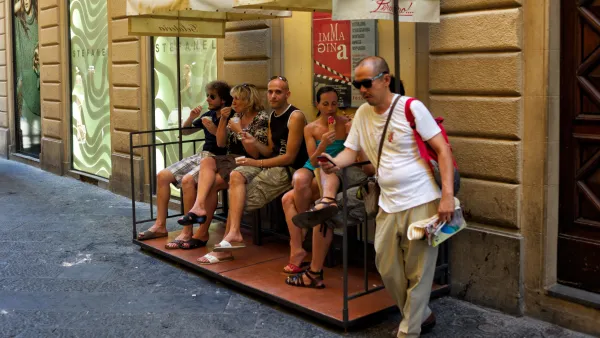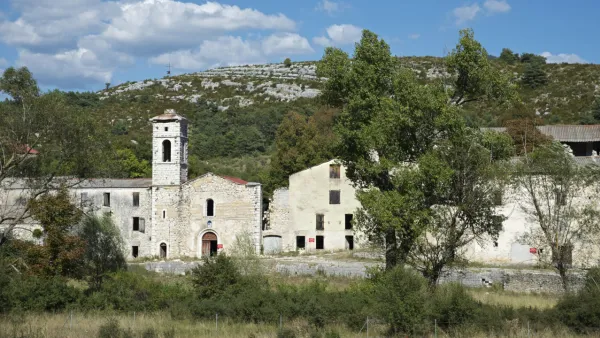Community / Economic Development
Top 100 City Innovators Worldwide
To celebrate its first anniversary, Future Cities has assembled a list of the top 100 city innovators making the biggest difference across a range of industries and specialties.
England's Rust Belt Cities Struggle to Find Their Post-Industrial Footing
While London struggles with "supergentrification" and rising home prices, England's rust belt cities suffer from long-term decline and the withdraw of public spending. How can these places find their post-industrial footing?

The Next Big Thing: "Sit-able Cities"
Supported by imagery of human urban conduct, Chuck Wolfe argues that walkable is good, but sit-able is better—and that "it’s time for the next big focal point and the next big idea, the 'Sit-able City'."
Place-Based Federal Initiative Offers Promise for Reducing Poverty
With urban inequality getting increased attention from politicians and pundits, many have wondered whether cities actually have the tools to address this growing challenge. A new federal initiative offers a promising solution.
Brooklyn Brands Borough's First Bike-Friendly Business District
One of Brooklyn's busiest streets has been branded a "Bike-Friendly Business District", with cyclists offered discounts at participating stores. But without plans for a dedicated bike lane, cycling advocates are skeptical of the pronouncements.
Federal Dysfunction Imperils Improving City Finances
A new report from the National League of Cities shows municipal revenues climbing across the U.S. in the aftermath of the worst economic crisis in decades. But pension and health costs, and federal budget issues, are causing concern.
Is Stagnation the Only Alternative to Gentrification?
David Madden laments that our current debate over gentrification, whether bemoaning a loss of authenticity or trumpeting the good that trickles down, "doesn't do justice to everything at stake." He suggests how to reorient the discussion.
As Tech Grows, So Does San Francisco's Influence
Nathan Heller illuminates how the tech industry has rendered San Francisco the new "power city" for U.S. economic growth and culture.
How a Railway Near the Bastille Revolutionized How We Think About Obsolete Infrastructure
Joseph Heathcott presents a historical narrative of the decline, revitalization, and gentrification of the Parisian neighborhood surrounding the Promenade Plantée and Viaduct des Arts, the pioneering repurposing of obsolete urban infrastructure.
Immigrants Help Revive Struggling Midwestern Cities
As the U.S. struggles once again to pass comprehensive immigration reform, Midwestern cities like Dayton, Ohio see attracting immigrants as the key to reversing population declines, reviving distressed neighborhoods, and boosting their economies.

What Is a Place Without the People?
In an illustrated essay, Chuck Wolfe contrasts the ideal form of the New England town with an abandoned French village, calling out the human infrastructure essential to successful urban places.
Searching for a Sequel to the Plan of Chicago
Calling Chicago a "city on the brink", the editors of the Chicago Tribune issue an "RFP" for residents and civic groups to put forth a vision for Chicago that can address its chronic woes, ensure its survival, and inspire people to action.
Next for Facebook: Building a Company Town
Last week, Facebook announced that it is working with a local developer to build a 394-unit housing complex adjacent to its campus in Menlo Park, California.
Recognizing Lively Urban Spaces as the Heart of Resilient Communities
Based on lessons from recent disasters in Chicago and New York, where lively urban spaces helped communities to survive and recover, Michael Kimmelman suggests that neighborhood libraries could be designed with such a purpose in mind.
CEQA Reform: The Year in Review
Three groups review the final bill (also known as Kings Arena bill) that reformed California's landmark, but controversial 1970 environmental law known as CEQA: CA Economic Summit, NRDC and Climate Plan. All credit the author, Sen. Darrell Steinberg.
Can Coca-Cola Burnish its Reputation with "Downtowns in a Box"?
For good reason, Coca-Cola is better known for supplying the world with high-calorie sugary drinks than empowering residents of poor countries. By partnering with Qualcomm Technologies to produce the "EKOCENTER" kiosk, that may soon change.

America's First Non-Profit Supermarket Provides a Model for Alleviating Food Deserts
Last weekend a new supermarket opened in Chester, Pennsylvania. But this isn't just another Safeway, Chester's groundbreaking non-profit supermarket could provide a model for areas across the country struggling to attract full-service grocers.
How is Technology Transforming the American City?
For a feature on Technology and the City, Architectural Record examines how the digital economy and tech culture are transforming Chattanooga, Detroit, Austin, and San Francisco. Many changes are welcome, but can urban success become too successful?
Car-Free Events Improve Cash Flow for L.A. Businesses
A new study by UCLA's Luskin School of Public Affairs has found that the city's popular CicLAvia open streets event has been a boon to local businesses: boosting sales 10% for businesses along the route and 57% for those participating.
Population Growth and Prosperity Don't Go Hand in Hand
If your city isn't attracting hordes of new residents does that mean it's not growing economically? Richard Florida and his colleagues seek to undermine those who equate population growth with economic health.
Pagination
Urban Design for Planners 1: Software Tools
This six-course series explores essential urban design concepts using open source software and equips planners with the tools they need to participate fully in the urban design process.
Planning for Universal Design
Learn the tools for implementing Universal Design in planning regulations.
EMC Planning Group, Inc.
Planetizen
Planetizen
Mpact (formerly Rail~Volution)
Great Falls Development Authority, Inc.
HUDs Office of Policy Development and Research
NYU Wagner Graduate School of Public Service


































